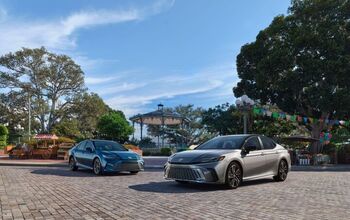Electric Cars = Quiet Roadways? Not so Fast…

Because we’ll all be travelling around in autonomous electric pods any day now, more and more people want to know whether they’ll be able to hear a pin drop on the sidewalk once those nasty internal combustion vehicles are extinct.
Well, if it’s serene, pastoral bliss you’re looking forward to, don’t expect to find it anywhere near a freeway. The folks at Clean Technica looked at the best studies available on the issue, and the results are bad news for those who think “EV” is another word for “whisper.”
No longer as rare and exciting as when the first models hit the market, electric vehicles still make up only a tiny sliver of overall market share. But the day might come when we’re all dependent on ions for propulsion, instead of evil hydrocarbons.
In order to prevent the crushing of small children and other bipedal creatures in urban environments, EVs emit a a high-pitched whine that doesn’t travel very far. They’re infinitely quieter than revving gas engines, booming diesels and the symphony of stressed exhaust systems.
So, yes — at low speeds, EVs are quiet as hell. But there’s so much else to the picture.
First, think of what you hear right now. Traffic has always been this noisy, right? Wrong. Advancements in engine and tire technology means today’s vehicles are far quieter than those produced even a few decades ago. You’re already hearing less noise than you used to.
But back to EVs. While EVs emit next to no engine noise, that’s their only saving grace. As speeds rise, a gas-powered vehicle’s engine noise falls as a percentage of overall noise, and tire noise picks up. Two highway traffic noise studies published by researchers in the U.S. and Netherlands show an insignificant gap between tire noise and overall noise at highway speeds.
EV tires aren’t magical — they’re made of the same stuff as every other tire. And that abrasive rubber is rolling along an imperfect surface made of asphalt.
The U.S. study found that aerodynamic noise — the sound made by a vehicle pushing air out of its way — outweighs engine noise in internal combustion vehicles at speeds above 110 kilometers per hour (68 mph). Even at low speeds, tire noise outweighs engine noise by a factor of 2:1.
In fact, tire noise and overall noise were so closely tied, the difference between the two wouldn’t be noticeable to the human ear (less than three decibels).
The Dutch study, which used different methodologies, backs up most of the U.S. findings. At 25 miles per hour, engine noise is slightly higher than tire noise, but both are outweighed by overall “road noise.” Once speeds hit 43 mph (70 km/h) engine noise was nearly half of the noise emitted by tires. At 60 mph, engine noise has little significance.
So, while there’ll be less “sharp” sounds in our electric future — tire chirping, revving, and obnoxious mufflers — overall highway noise will continue with little change. Your emissions-free Tesla, Bolt, Leaf or whatever comes next will keep oil in the ground, but it won’t stop noise pollution.

More by Steph Willems
Latest Car Reviews
Read moreLatest Product Reviews
Read moreRecent Comments
- Verbal Rented a Malibu a while back. It was fine, if a bit gutless.I get that Detroit wants to go all-in on high profit margin SUVs and blinged-out MAGA trucks. Everyone has known for decades that they can't compete on price in the affordable sedan space. So now all of Detroit's sedans are gone except for a couple of Cadillac models.But you'd think that just one of the domestic brands could produce a fun, competitive and affordable sedan. Just one? Please? Anyone? Bueller?
- 3-On-The-Tree I wouldn’t even use Ford as a hearse for fear of being late to my party.
- SCE to AUX Norway is in Europe, and Tesla is an American automaker - no problems there.I wouldn't use Ford as the bellwether.https://www.reuters.com/business/autos-transportation/tesla-extends-lead-norway-evs-take-record-82-market-share-2024-01-02/https://elbil.no/english/norwegian-ev-policy/
- Steve Biro If the U.S. government wants to talk about banning all connected cars - or at least the collection and sharing of information from said vehicles - I’m all ears. Otherwise, don’t waste my time.
- Ajla Both parties are in favor of banning Chinese vehicles so I don't see how it won't happen in the next year.


































Comments
Join the conversation
I figured it would be tire noise. That's what I mostly hear from the majority of vehicles on the road. Especially people who neglect to rotate their tires or do not rotate them correctly (looking at the buffoons that rotate only front to back and the tires end up cupping as a result - because you know like changing out that winter and summer air you should never cross-rotate radial tires!)
Sirens - when we do go fully self driving let's convert them back to bells.. Well done Japan keeping your fire truck bells for gentler occasions.